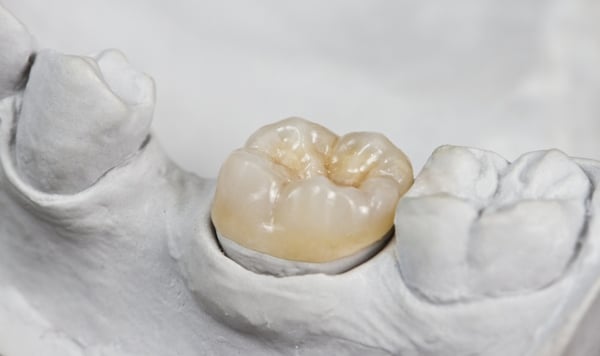
Some of us have heard that dreaded phrase at a dentist's office: "You need a crown." An effective solution for restoring a tooth when a filling isn't enough, crowns are also invasive and expensive.
However, with new techniques and technologies available, top dentists in the profession are able to use more conservative methods before considering a crown. If you want to fix a tooth and avoid crowns, read on to learn what you need to know.
What is a crown?
A crown is a covering or cap that fits over the stub of a tooth. The cap replaces the structure, support, and aesthetics of the original tooth.
Dentists use crowns if the original tooth is cracked, chipped, or broken; if it requires a filling that's too large for the tooth to support; if it has too much decay or is too worn; or if it's extremely discolored or misshapen. A tooth is also crowned to cover a dental implant or hold a bridge in place.
What's the procedure?
When you get a crown, your dentist must grind the tooth down to a stump, which usually involves the removal of perfectly healthy tooth. Getting a crown traditionally requires two visits: During the first visit the dentist shapes the tooth, takes impressions, and places a temporary crown.
Meanwhile, the impressions go to the lab where the crown is fabricated, which takes a few weeks. When the patient returns for the second visit, the dentist installs the permanent crown. Advanced digital technologies are now available through some practices that allow single-visit crowns to be made as well.
Today's advanced dental technology offers highly-skilled, well-trained dentists ways more opportunities to apply fillings before resorting to crowns. So in order to avoid crowns when you want to fix a tooth, here are some tips:
1. Referrals
Ask friends and family about how conservative their dentist appears to be before resorting to crowns for tooth restoration. Look out for practitioners that seem to give the majority of their patients the "royal" treatment too hastily.
2. Online reviews
Your dental office should have a definitive online presence, showing reviews both on social media and through their website. You'll also learn about the dentist, their practice, their approach, and the latest techniques they're using.
3. Innovative technology
Find a dentist who's up-to-date with current innovations in dental restorations. For example, Dr. Linger uses the operating microscope. His expertise gives him more flexibility in shaping and filling the tooth and ensures greater comfort for the patient.
4. Asking questions
Don't be afraid to ask about estimates on how many patients the practice treats with fillings versus patients that receive crowns. And all team members should be willing and able to describe the dentist's position when it comes to keeping the natural tooth intact.
Ask about their equipment, their criteria for deciding when a crown is necessary, their continuing education and professional development, or anything else that seems relevant. After all, it's your teeth.
5. Prevention
Avoid snacks like popcorn, gummies, licorice, and other foods that stick to or get stuck between your teeth. Eliminate habits like crunching on ice and hard candies. Nostalgic for that everlasting gopper stopper or jawbreaker?
Chomping down on these goodies can push a weakened, compromised tooth over the edge. Finally, the best thing for your teeth is preventative care: Brush at least twice a day, floss at least once, use an ADA-approved dental rinse, and have your teeth professionally cleaned at least twice a year.
About Dr. Linger
Dr. Linger uses a conservative approach to tooth restoration and employs the operating microscope for all restorative procedures. By doing so, he can now apply fillings to teeth which may have required a crown just a few years ago. Dr. Linger reserves the placement of crowns for when the health of surrounding teeth is endangered. Besides working extensively with the operating microscope, he specializes in using a caring approach to dentistry, keeping the patient's comfort a priority.
If you have any questions about restorative treatment or would like a free consultation in Charlotte, NC, don't hesitate to contact us.



